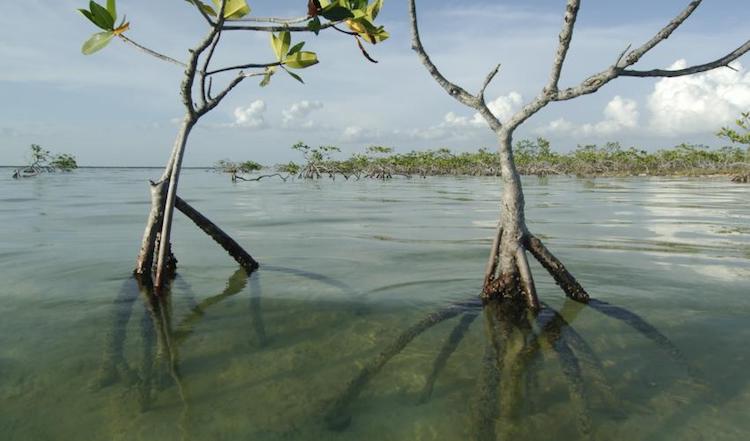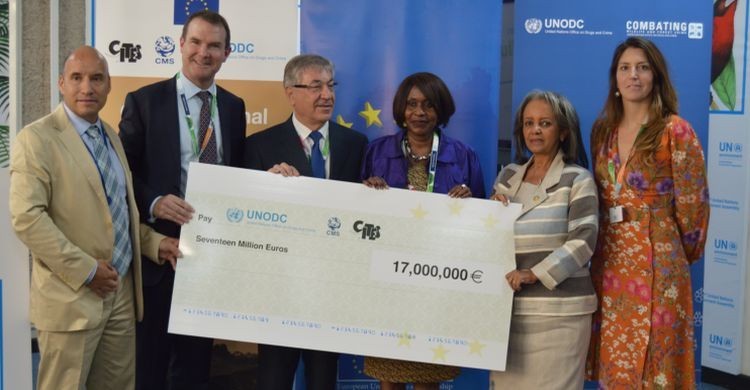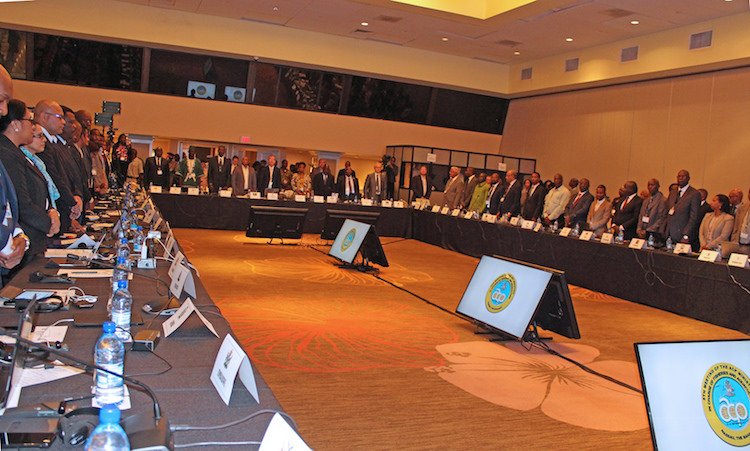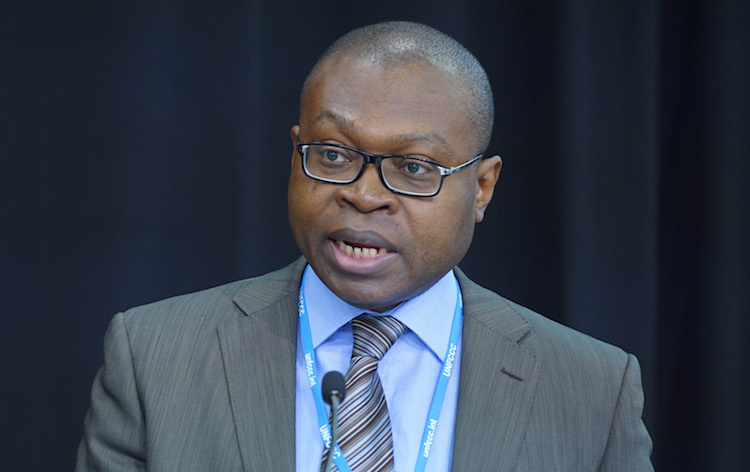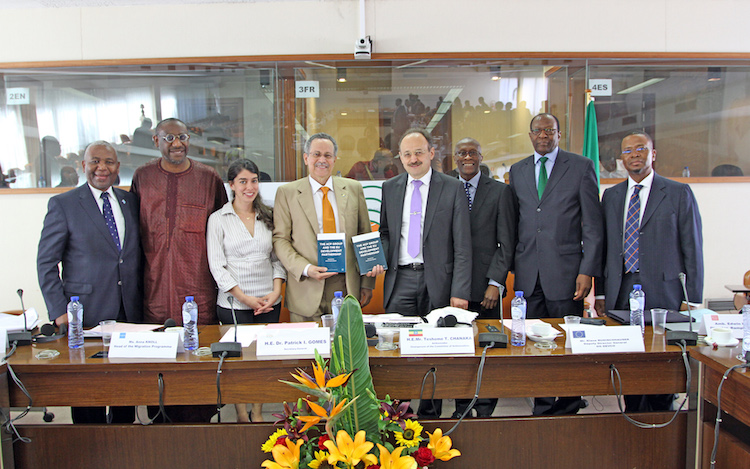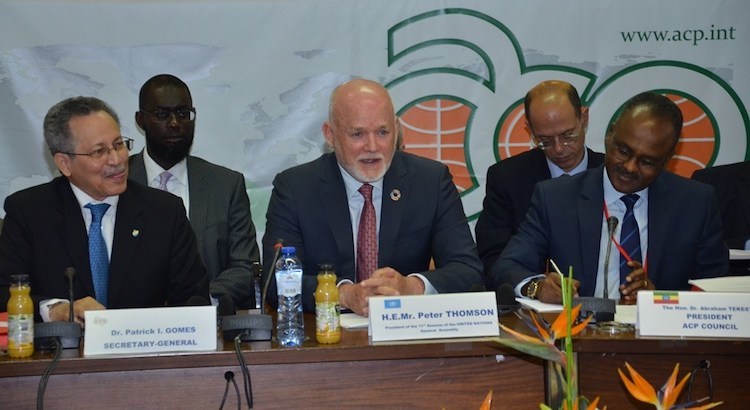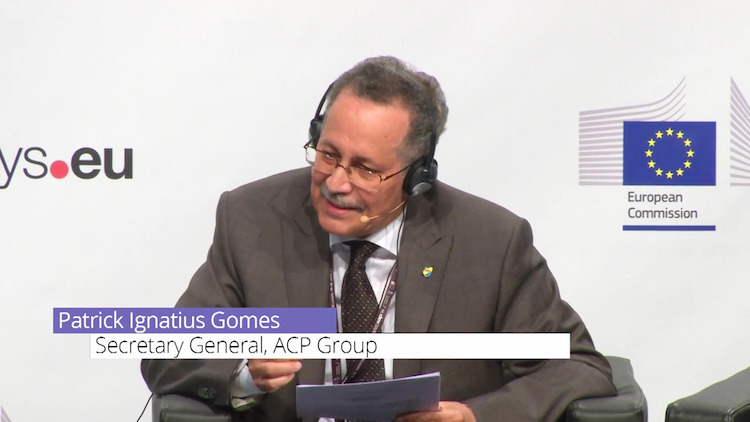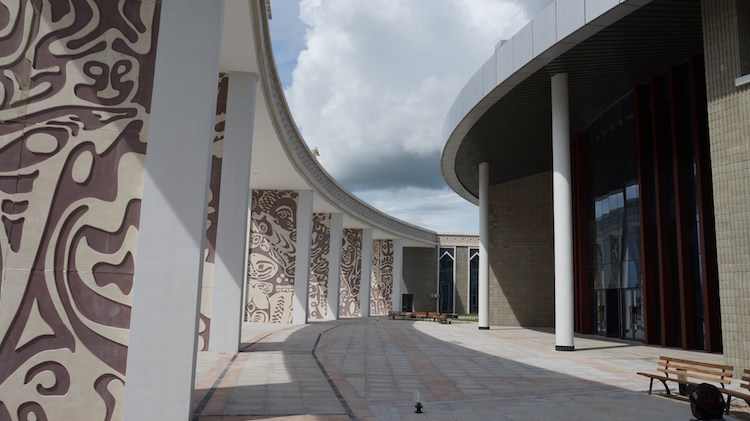By Jaya Ramachandran BRUSSELS (IDN | IUCN) – “The protection and sustainable management of biodiversity in ACP countries requires a comprehensive approach that extends beyond the establishment of protected areas,” according to Patrick I. Gomes, Secretary-General of the ACP Group. It is against this backdrop that the ACP (African, Caribbean and Pacific) Group of States […]
ACP Greets EU-UN Action To Combat Wildlife Trafficking
BRUSSELS (IDN) – The 79-nation African, Caribbean and Pacific (ACP) Group of States has welcomed the European Union’s decision to launch a coordinated action jointly with the United Nations to counter the illegal killing and trafficking of wildlife in Southern and Eastern Africa and the Indian Ocean. As part of a 30 million Euro (35.3 […]
79 ACP Countries Resolve ‘Blue Growth Initiative’
By Jaya Ramachandran
BRUSSELS (IDN) – The African, Caribbean and Pacific countries, constituting the ACP Group of States, are determined to develop the fisheries and aquaculture sector in their countries, and unlock the potential of the ‘blue economy’ through a new 40 million Euro (about US$46.8 million) “ACP Blue Growth Initiative”.
The decision to that effect was announced at the conclusion of the 5th ACP Meeting of Ministers in charge of Fisheries and Aquaculture, who gathered in Nassau, the capital city of the Bahamas – the coral-based archipelago in the Atlantic Ocean Bahamas with 700-plus islands – from September 18 to 21, 2017.
79 Countries Gather in the Bahamas to Address Sustainable Development of Fisheries and Aquaculture
By Viwanou Gnassounou
ACP Assistant Secretary General for Sustainable Economic Development and Trade.
Fisheries and aquaculture are critical for poverty eradication and sustainable development in Africa, the Caribbean and the Pacific. With this in view, ministers and senior government officials from 79 countries that constitute the ACP Group of States will gather in Nassau, the capital city of the Bahamas – the coral-based archipelago in the Atlantic Ocean Bahamas with 700-plus islands – from September 18 to 21, 2017. “The focus will be on bolstering high level shared commitments, sharing national or regional best practices and seeking consensus on priority issues that need multilateral action,” says Viwanou Gnassounou, ACP Assistant Secretary General for Sustainable Economic Development & Trade. – The Editor
The ACP Celebrates 42nd Birthday and Reflects on the Future
By Klara Smits
BRUSSELS (ACP-IDN) – The African, Caribbean and Pacific (ACP) Group of States commemorated ‘ACP Day 2017’ on June 2, reflecting on “development partnership” with the European Union (EU), which it described as “a multi-dimensional and transformative experience”.
These issues were discussed in two panels. But in greater detail in the book – The ACP Group and the EU Development Partnership: Beyond the North-South Debate – launched on the occasion. The book constitutes a systematic and critical assessment of the nature, evolution, and prospects of the development partnership between the 79-member African, Caribbean, and Pacific (ACP) group of states and the 28-member European Union (EU).
79 ACP States Reflect on Future Ties with EU and the World
By Jaya Ramachandran
BRUSSELS (ACP-IDN) – The African, Caribbean and Pacific (ACP) countries are determined to “undertake the reforms needed to transform the ACP Group into an effective global player, fit for the 21st century, and responsive to the emerging priorities” of member states.
This emerged from the two-day gathering of the ACP Council of Ministers who concluded the 105th session on May 4 with key decisions that will influence how the bloc of 79 countries will carve out a more effective role in the international arena.
According to the President of the Council, Ethiopia’s Minister of Finance and Economic Cooperation, Dr Abraham Tekeste, “The current occupancy of the Presidency of the UN General Assembly by Fiji, and the current membership of Senegal and Ethiopia in the UN Security Council, serve to underscore the positive contributions by ACP countries at the global levels.”
Brexit Implications for 79 ACP Countries Yet Unknown
By Robert Johnson
LONDON (IDN) – The outcome of the Brexit referendum on June 23, 2016 has set the UK on a path to leave the European Union (EU) that will also result in an end to its membership of the bloc’s Economic Partnership Agreements (EPAs) the free trade deals between the European Union (EU) and the 79 countries of the African, Caribbean and Pacific (ACP) group.
According to experts, while Brexit will have consequences for the UK, its impact on the ACP countries could be far reaching. Precisely how and in what ways was the subject of a brainstorming session of leading experts organized by the Ramphal Institute on July 15.
Named after Shridath “Sonny” Ramphal, second Commonwealth Secretary-General (1975-1990), the Ramphal Institute’s mandate is to tackle development issues and the wider world. So the focus was on Brexit and the Economic Partnership Agreements (EPAs).
ACP Group to Engage UK Early On Brexit Implications
By Roland Joshua
BRUSSELS (IDN) – The implications of BREXIT on the African, Caribbean and Pacific (ACP) Group could be far-reaching and may give rise to many consequences for trade, services, investments and development finance assistance, according to ACP Secretary-General, Dr. P.I Gomes.
In each of these areas, the ACP-UK relations have been longstanding and mutually beneficial, not only for Caribbean countries and other Commonwealth member states, but for the ACP Group as a whole.
For instance, as a contributor of some 17% to the European Development Fund (EDF), the UK has been consistent in its support and has argued in favour of making the EDF less cumbersome in its regulations. “With the UK outside of the EDF Committee the ACP will lose an ally of great value,“ Dr. Gomes said.
Papua New Guinea Hosts a ‘Pivotal’ Summit of 79 Diverse States
Analysis by Ramesh Jaura
BERLIN | BRUSSELS (IDN) – Perhaps it would be an exaggeration to say that the world would never be the same again when leaders from the 79 countries of the African, Caribbean and Pacific (ACP) Group of States conclude their three-day “pivotal Summit” on June 1 in Port Moresby, Papua New Guinea (PNG).
But top echelons of the bloc are determined to turn it into “a watershed event” that would discuss the future of the ACP Group as a revitalised cohesive force advocating the interests of its member states in the international arena.
They want it to provide the necessary political mandate to reorient the organisation, and offer a basis for more concrete engagement in discussions on the future of ACP-EU relations after 2020 when the Cotonou Agreement ends. The accord is named after the largest city and economic centre of Benin. Formal negotiations for a follow up framework of the Cotonou Agreement are expected to commence in 2017/2018.
Trade and Development Finance Top ACP Ministers’ Agenda
By International Press Syndicate
BRUSSELS (IDN) – Ministers representing African, Caribbean and Pacific countries will take key decisions when they gather in Dakar, Senegal, on April 25 to address sustainable economic development, trade and political issues in ACP countries, reports the ACP Press Office.
The Senegal Prime Minister Mohammed Dionne will open the 103rd session of the ACP Council of Ministers on April 26. The three-day programme from April 25 to 27 will include preparatory meetings of the Development Finance Committee, ministerial consultations on commodities (sugar, cotton, bananas), and the plenary session chaired by Leon Raphaël Mokoko, the Minister of Planning and Integration of the Republic of Congo.
The ACP Council of Ministers will lead into the 41st session of the ACP-EU Joint Council of Ministers on April 28-29, which will be officially opened by the President Macky Sall of Senegal.

